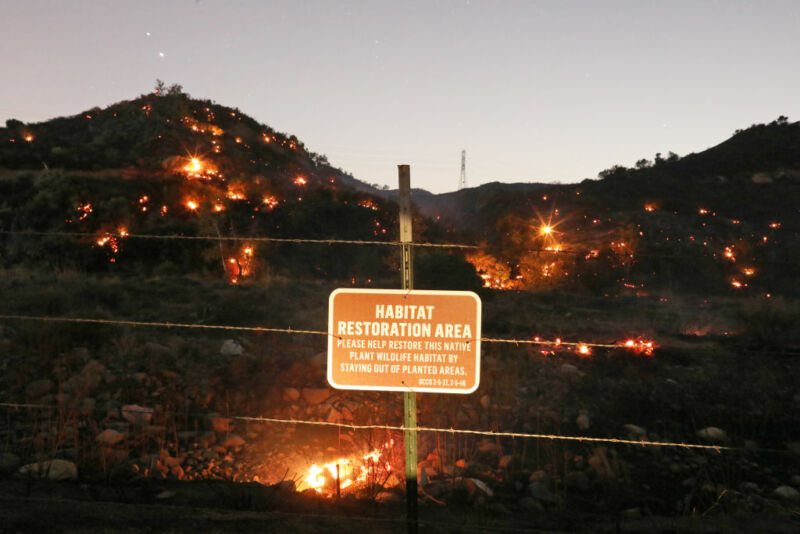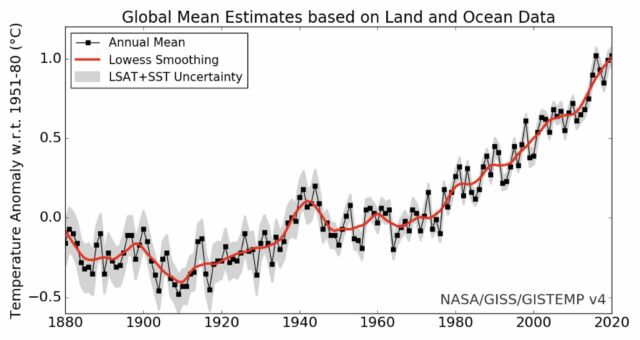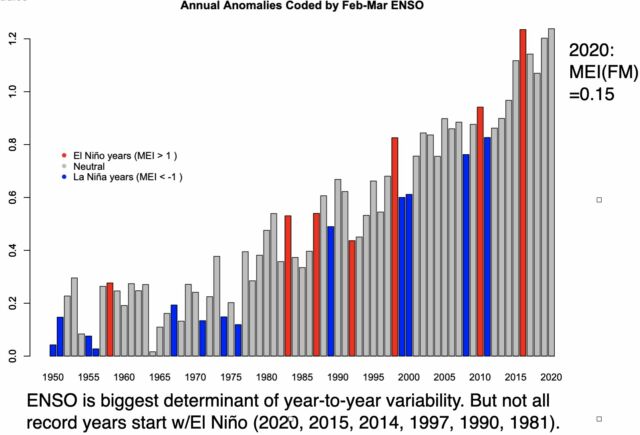2020 ties 2016 as the warmest year on record

Today, NASA and NOAA are announcing that 2020 was one for the record books, tying with 2016 for the warmest year since we’ve been tracking temperatures. NASA rates 2020 as the warmest ever, although by a margin that’s not large enough to reach statistical significance; NOAA reverses the order, also without a significant difference between the two years. Whatever its precise rank, 2020 was the continuation of a worrying trend—the past seven years are all on the list of the seven warmest years on record, regardless of which source you turn to for your global temperatures.

Another reason for concern is that 2020 saw the El Niño-Southern Oscillation (ENSO) in a state that, in the absence of human-driven climate change, would have produced relatively cool conditions. NASA’s Gavin Schmidt said that, in the absence of the influence of the ENSO, 2020 would have been the warmest year on record. As shown in the chart below, strong El Niño years tend to be associated with warm records, while the cycle’s opposing conditions, called La Niña, are typically associated with cooler conditions. 2016 was notable for having the strongest El Niño since the 1990s, an event that pushed temperatures far above the baseline where they’d spent most of the start of the century.
Since then, the ENSO has been largely stuck in neutral, shifting back and forth between weak El Niños and La Niña tendencies. Temperatures dropped slightly, but not back to the conditions that were typical of the decade prior. 2020 saw temperatures match those of 2016’s strong El Niño despite remaining stuck in neutral. “The previous record warm year, 2016, received a significant boost from a strong El Niño,” Schmidt said in a statement. “The lack of a similar assist from El Niño this year is evidence that the background climate continues to warm due to greenhouse gases.”

Despite that, the record temperatures were no surprise. A look at the monthly readings shows temperatures very similar to those of 2016 throughout the year. April, May, September, and October were all record months in NASA’s analysis, making the year’s record-setting warmth anything but surprising.
For those keeping track of longer trends, this marks over 28 years since NASA has registered a month where the average global temperature was lower than that of the period between 1950 and 1980. NOAA estimates that it has been 44 years since there has been a year with global temperatures below the 20th-century average, meaning that there are people who are grandparents that have never experienced an unusually cool year.
Overall, the past few years have all been in the neighborhood of 1.2ºC above the average temperatures of last century. That’s getting very close to the 1.5ºC of change that many countries have pledged to try to stay below. At current rates of change, we might start seeing temperatures exceed that landmark in a decade or so.
Both NASA and NOAA note that the year saw many of the sorts of events you might expect in a warming climate. Australia, California, and Siberia all saw severe fire seasons, driven by a combination of heat and changed precipitation patterns. And the tropical cyclone season was unusually active, especially in the North Atlantic. While it’s difficult to attribute any single weather event to climate change, trends in the overall number of these events are becoming difficult to explain in any other way than through climate change, as NASA explains in the video below.
Overall, the continued warming is noteworthy but completely expected, and it certainly doesn’t challenge our understanding of the impact of greenhouse gases. But it’s probably an important validation of the science for the public. And that, combined with the “increasing desperation of those opposed to doing anything about climate change,” could help smooth the path for the incoming Biden administration’s plans for addressing climate change.
NASA and NOAA will be hosting a press conference later today; we will update this story if there’s significant new information.
https://arstechnica.com/?p=1735132